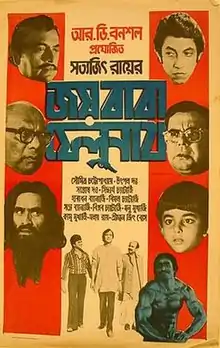Joi Baba Felunath (film)
Joi Baba Felunath (The Elephant God)[1] is a 1979 Indian Bengali mystery film by director Satyajit Ray, featuring Soumitra Chatterjee, Santosh Dutta, Siddartha Chatterjee, Utpal Dutt among others. The film is based on the famous Feluda novel of the same name written by Ray himself. It is the second film of Feluda as well as the sequel of Sonar Kella directed by Satyajit Ray. After the demise of Santosh Dutta (Jatayu), Ray remarked that it was impossible to ever make a Feluda film again without Dutta.[2]
| Joi Baba Felunath | |
|---|---|
 A Poster for Joi Baba Felunath | |
| Directed by | Satyajit Ray |
| Produced by | R.D.B. Productions |
| Written by | Satyajit Ray |
| Starring | Soumitra Chatterjee, Santosh Dutta, Siddartha Chatterjee, Utpal Dutt, Haradhan Bandopadhyay, Biplab Chatterjee |
Release date |
|
Running time | 112 minutes |
| Country | India |
| Language | Bengali |
| Budget | Rs 6 lakhs |
| Box office | Rs 7 lakhs |
| Author | Satyajit Ray |
|---|---|
| Cover artist | Satyajit Ray |
| Country | India |
| Language | Bengali |
| Genre | Detective fiction |
| Publisher | Ananda Publishers |
Publication date | 1975 |
| Media type | |
| Preceded by | Royal Bengal Rahashya |
| Followed by | Ghurghutiyar Ghatona |
Plot
Feluda, his cousin Topshe and the thriller writer Jatayu visit Benaras during the pujas. There they meet a Bengali family, the Ghosals. Upon hearing that Feluda is a private investigator, the Ghosal family head entrusts him with the task of finding out the thief of the attempted theft that took place in their house. Meanwhile, the arrival of a saint by the name of 'Machhli Baba' in Benaras rouses the excitement of the local people.
A very valuable property of the Ghosals, a golden Ganesh statue, about three inches in height, was the target of the thief. On the other hand, Maganlal Meghraj, a wealthy Marwari businessman, had his eyes on the Ganesh for a very long time. He comes to know about the involvement of Feluda in this case. He invites Feluda, Topshe and Jatayu to his house and offers Feluda Rs.2000 so that he abandons the case. Feluda refuses, which angers Maganlal, and he sets up a knife throwing show, using Jatayu as the bait (much to the viewer's amusement). After the incidents in Maganlal's house, Feluda takes a vow - either he will avenge Jatayu's harassment, or quit being a sleuth.
Although warned by Maganlal, Feluda did not lose interest in the case, and deduces that Machhli Baba is actually a fraud working for Maganlal. A member of the Ghosal family, Bikash, was also bribed by Maganlal to steal the Ganesh and hand it over to him. Feluda gets hold of Bikash and makes him confess his involvement in the theft. But Bikash states that when he went to steal the Ganesh, it was not there. Several questions arise in Feluda's mind. Where is the Ganesh, then? Why was the innocent idol-maker of the Ghosals, Shashi Babu, murdered brutally? What plan did the Ghosal family head hatch upon with his grandson to save the Ganesh?
The story has two sub plots. On one hand, it is the story of the acquisitive instinct of a greedy Marwari businessman, who would spare no expenses or ways to get what he desires, even if it is at the cost of murdering innocents and bribing the willing. On the other, it is also the tale of cautionary foresight exercised by the family head.
Cast
- Soumitra Chatterjee as Feluda, the Bengali sleuth from Calcutta
- Utpal Dutt as Maganlal Meghraj, a Marwari businessman, the main antagonist of the film
- Santosh Dutta as Jatayu (Lalmohan Ganguly)
- Siddartha Chatterjee as Topshe, Feluda's cousin and assistant
- Jit Bose as Ruku
- Haradhan Bandopadhyay as Umanath Ghosal, Ruku's father
- Biplab Chatterjee as Bikash
- Kamu Mukherjee as Arjun, the knife thrower in Maganlal's house (cameo)
- Monu Mukherjee as Machhli Baba (cameo)
- Panineeta Bandhyopadhyay
- Subrata Devi
- Satya Banerjee (P.L.T.) as Niranjan Chakrabarty, 'the hotel manager'
- Indubhushan Gujral as Inspector Tiwari
- Moloy Roy as Biswasree Gunomoy Bagchi
- Santosh Sinha as Sashi Babu, the idol maker
- Bimal Chatterjee as Ambika Ghosal, head of the Ghoshal family
See also
- Sonar Kella (1974)
References
- Andrew Robinson (1989). Satyajit Ray: The Inner Eye. University of California Press. pp. 237–. ISBN 978-0-520-06946-6. Retrieved 10 December 2012.
- Satyajit Ray; Bert Cardullo (1 March 2007). Satyajit Ray: Interviews. Univ. Press of Mississippi. pp. 35–. ISBN 978-1-57806-937-8. Retrieved 10 December 2012.
- "US academy has restored Ray films, see them at film festival". The Indian Express. Retrieved 7 November 2008.
.jpg.webp)